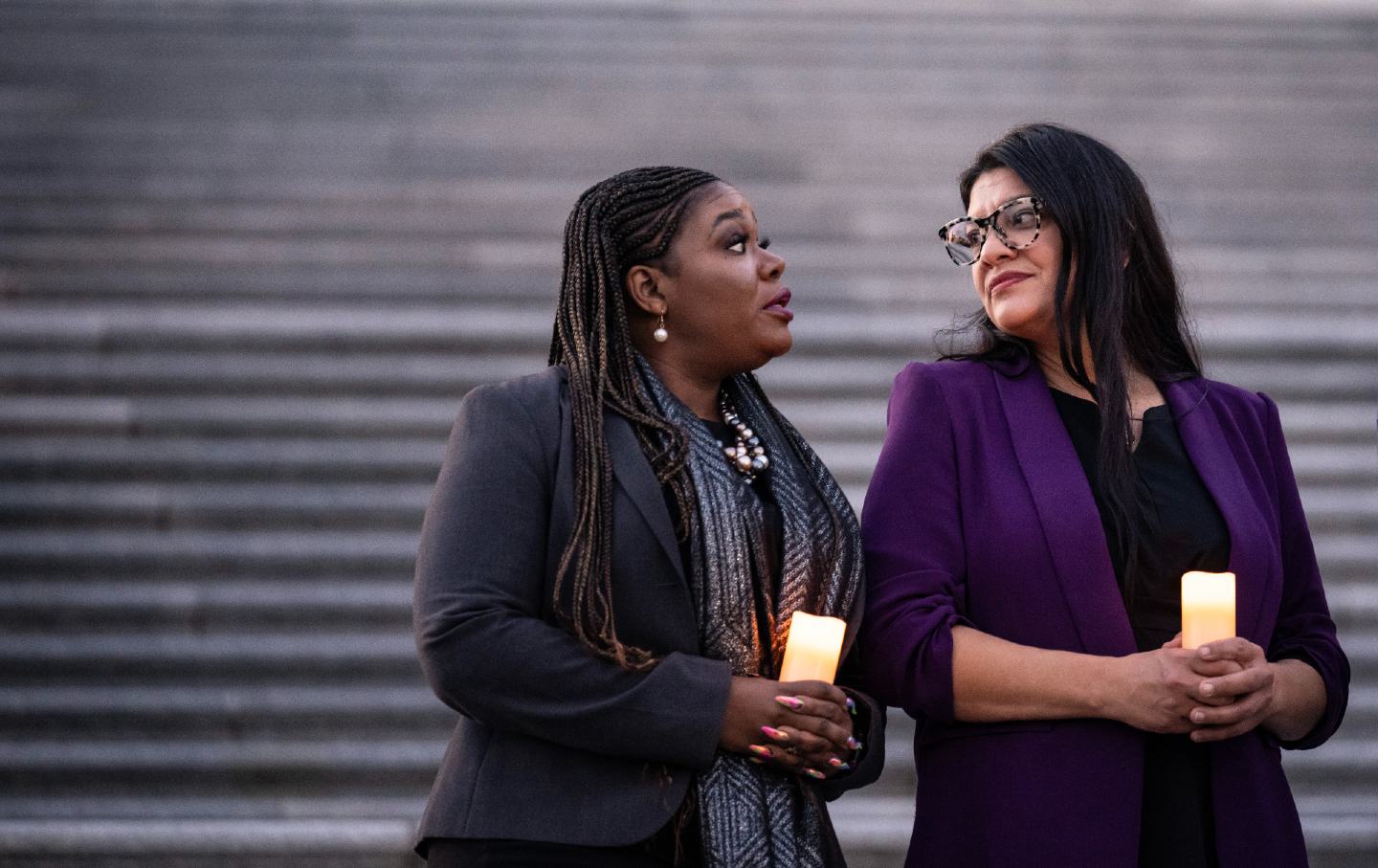Why It’s Important to Defend Representative Rashida Tlaib Against Censure, Whether or Not We Agree With Her
The First Amendment doesn’t permit us to punish political expression in America.

True to its increasingly repressive and authoritarian agenda, the House GOP Conference moved this week to censure my colleague Congresswoman Rashida Tlaib for political comments she made that were clearly protected under the First Amendment and the Speech or Debate Clause of the Constitution. Although I told Representative Tlaib I strongly disagreed with her benign interpretation of the offending phrase (“from the river to the sea”), I rose on the House floor nonetheless to defend her as a Member against the Republicans’ outrageous misuse of the House disciplinary process to punish her political expression.
I noted that, in the history of the U.S. House of Representatives, the overwhelming number of censures have been for conduct: taking bribes, embezzling funds, assaulting other Members, engaging in mail fraud, and having sex with pages. The only kinds of speech that have ever been punished have been true threats of violence towards other Members, fighting words on the floor towards other Members, and incitement to insurrection and secession—none of which are implicated here and none of which are protected by the First Amendment, according to the Supreme Court. I warned our GOP colleagues that politicizing and weaponizing the House’s censure mechanism in this shocking way will raise profound problems for their own Members, starting with the new Speaker of the House Mike Johnson, and all the others who traffic in lies, myths and right-wing ideological fanaticism.
The House voted 234-188 to censure Rep. Tlaib, with 4 Republicans voting not to censure her and 22 Democrats joining the Republicans’ exercise in thought control.
A formatted version of those remarks follows (the original written text as opposed to the spoken version).
Rep. Samuel F. Bellman and the Rights of the Minority
I have images of three politicians displayed in my office: Abraham Lincoln; Robert F. Kennedy; and Samuel F. Bellman who was the first Jewish person ever elected to the Minnesota legislature, a great champion of the Constitution, civil rights and civil liberties, and human rights, and of the creation of Israel, the Jewish Democratic State, in 1948.
And he was my grandfather.
He was elected at a time of terrible antisemitism, not unlike today. Minneapolis was called “the antisemitism capital of America” and my Grandpa Sam told me a story I’ll never forget.
The Democratic-Farmer-Labor (DFL) and Republican Caucuses both had their annual retreats at a country club that did not allow Jews or blacks to enter. My grandfather complained privately with the Speaker that he would not be able to go, and the Speaker apologized but said this was the tradition.
So my grandfather, the only Jewish person in the Chamber, spoke on the floor about antisemitism—and he was booed and jeered at, and Members left as he tried to speak.
When the Minority Leader asked me to manage our time today, I thought about my grandfather and how he must have felt on that day.
So I’m here not in spite of the fact that I am a Jewish American who supports the Constitution and the Jewish Democratic State and hates the antisemitic tyrants and terrorists of the world, from Vladimir Putin in Russia and Mohammed Bin Salman in Saudi Arabia to Hezbollah and Hamas; I am here because of these things and because of everything I believe in and stand for.
At this moment when democracy is under siege all over the world, America must stand tall for the Constitution. But this Resolution is about one thing and one thing only: the punishment of speech.
The Apple of Constitutional Freedom
We have the chance to show the world what the American Constitution means and how we hold fast to our core principles even when we are drawn away from them by our passions and our righteous anger.
The Constitution is “the Supreme Law of the land,” and the very heart of it is in our First Amendment, which protects every citizen’s freedom of speech and says Congress shall make no law abridging it.
The freedom to speak includes the freedom to disagree, the right to think radically differently from the majority about important things, or else it is no freedom at all. It’s easy to defend free speech for people when you agree with them; the test for each Member is whether you can defend free speech for people when you most fundamentally and vehemently disagree with them.
Popular
“swipe left below to view more authors”Swipe →The First Amendment is like an apple. Everybody wants to take just one bite out of it. Someone wants to punish left-wing speech, someone right-wing speech, someone sexist speech, someone radical feminist speech, homophobic speech or pro-LGBTQ speech, anti-war speech, pro-war speech, religious speech, sacrilegious speech and everybody wants a bite of the apple, but then at the end of the day, once everyone has had his or her bite, the whole apple is gone.
There’s nothing left. If you want to save the apple, you have to learn to tolerate not just the speech you love the most, which is easy, but the speech you hate the most.
Like the First Amendment, the Speech or Debate Clause also embodies this central value in the legislative process. It states that Members of Congress “shall in all Cases, except Treason, Felony, and Breach of the Peace, be privileged from Arrest during their attendance at the Session of their Respective Houses, and in going to and from the same; and for any Speech or Debate in either House, they shall not be questioned in any other Place.” (emphasis added)
The Speech and Debate Clauses in the thirteen original colonies were the basis for the freedom of speech later established for all citizens; indeed, of the original 13, only Pennsylvania’s Constitution protected “freedom of speech” for anyone but legislators. In other words, we had better take freedom of speech seriously for legislators because if we don’t protect our own free speech, how can we protect freedom of speech for the people we represent?
We Censure Members for their Conduct, Not their Speech
In the two-and-a-half century history of our Chamber, Members have been overwhelmingly censured for their actions, not for their speech. Actions like:
- Participating in the violent assault against Charles Sumner. Assaulting Representative Josiah Grinnell of Iowa with a cane. Selling military academy appointments. Taking bribes.
- Selling $33 million of stock in the Credit Mobilier scandal to fellow Members at an undervalued price to bribe them.
- Engaging in mail fraud and payroll fraud.
- Improper use of campaign funds and Congressional funds.
- Engaging in sexual misconduct with a House page.
Do you see the difference? Not what they said, what they did.
I can find only three categories of cases where speech is the sum and substance of the charge—and they are all exceptions that have been ratified by the Supreme Court.
One is where the speech makes violent threats against other Members of the body. As the Supreme Court found as recently as April, in Counterman v. Colorado, “true threats” of violence are never protected under the First Amendment.
A second category is essentially fighting words, the use of unparliamentary or aggressively insulting language on the House floor that constitutes a direct affront to another Member.
The Supreme Court has also said fighting words are not protected.
The final is speech advocating or promoting treason, Confederate secession or insurrection, all of which arguably lie outside of the First Amendment because of numerous provisions opposing and condemning insurrection.
That’s it: violent threats against another Member, fighting words on the floor, speech inciting insurrection or secession.
The Republicans Want to Use the Disciplinary Process to Punish Rep. Tlaib for Her Speech and Ideas
But the Resolution offered against the gentlewoman from Michigan is all about censuring her for her unpopular political speech and literally nothing else. No actions, no conduct is being punished.
The entire censure motion is about her speech and how much we hate it and how wrong we think it is. All of that is fine for all of us to express individually—in newspapers and the media, on the floor and in committee, in social media and in conversation—and I have told Ms. Tlaib that the phrase “from the river to the sea” is abhorrent to me and cannot be salvaged politically, at least to my taste, even with her published explanation of what she means by it, which is certainly very different from the way Hamas uses it.
But, in any event, I would never think of disciplining her or punishing her because we disagree about that and have a dramatic difference in our political views.
We Don’t Punish People for their Political Ideas in America
But the Resolution proposes to condemn her for quoting this objectionable phrase in her video, which is indisputably protected speech under the First Amendment. Unlike the gentleman from New York, Mr. Santos, whose proposed expulsion by Members of the Majority was rejected by a commanding bipartisan majority because he has not yet been convicted of either the criminal or ethics charges against him, Ms. Tlaib has been criminally charged with nothing and has been civilly sued for nothing and has no ethics charges outstanding before the Ethics Committee.
It’s easy to see why. She can’t face criminal punishment or civil liability for her alleged speech offenses because in the United States of America we don’t punish people for their political ideas, no matter how wrong and offensive other people think they are. Congresswoman Tlaib won reelection with 71 percent of the vote in Michigan’s 12th district and if anyone is going to punish her for her political ideas or manner of expression, it must be the people of her own district, who sent her here to represent them.
Mr. Speaker, the disciplinary process should never be used to punish the political speech or viewpoints of a Member of this Chamber just because the majority disagrees. If you disagree, why don’t you get up and explain why your ideas are better than hers or where you think she has gone wrong in her values or analysis or explanation? Don’t punish her for not thinking the way you do.
The punishment of dissenting political viewpoints will mean that Members will be censured just for being in the minority rather than actually doing something wrong. And that will come to stifle significant dialogue and haunt all of us in our work.
For example, there’s another censure motion being proposed now against the Representative from Florida who compared “Palestinian civilians” to “Nazi civilians” and stated that “there are very few innocent Palestinian citizens.”
The Resolution stated that his outrageous conflation of innocent Palestinian civilians with Hamas terrorists is “false, misleading, dehumanizing, dangerous and unbecoming of a Member of Congress.”
This motion is the mirror image of the complaint against the Gentlewoman from Michigan, although in this case, significantly, the alleged offense consisted of statements that the Member himself made in his own words in the House.
But, in any event, both Members are being charged with what are inescapably speech offenses and thought crimes. And yet the case against the Representative from Florida has been held while we have moved to a vote against Ms. Tlaib. Why is that?
Solely because the Gentleman’s party is in the majority. But a disciplinary process which operates on the basis of raw partisan voting power has no integrity or legitimacy in the eyes of the public.
The minute we start punishing the content or viewpoint of Members’ political speech, the process inescapably loses its legitimacy and becomes just a partisan weapon.
Will Democrats Have to Censure the Extremist Political Ideas of MAGA?
For example, the Speaker of the House has taken positions in the past arguing that sex between consenting gay adults should be a crime, that the Supreme Court was wrong to strike down sodomy laws in Lawrence v. Texas and wrong to give gay people the right to marry in Obergefell, a right he said that is “the dark harbinger of chaos and sexual anarchy that could doom even the strongest Republic.” He even supported the idea that gay people could be cured of their malady with so-called “conversion therapy,” which has been discredited by science.
Now, the vast majority of Americans reject these positions as extreme in opinion polls, and believe that all citizens have the freedom to pursue their own love lives and to marry someone they love. If the House majority changes hands, should we censure the former Speaker for his constitutional apostasy and thought crimes against the rights of millions of Americans?
I sure hope not, because the Gentleman from Louisiana is absolutely entitled to his extreme political and religious views no matter how outside the constitutional and American mainstream they are and no matter how much I reject them. Under the First Amendment, extremism is in the eye of the beholder. But how will we resist the temptation to punish the former Speaker in the future if we set a precedent today that Members can be censured and canceled simply for their political heresies in the eyes of the majority?
If we say that the gentlelady can be punished because her views of history are wrong, can we then punish Members of this body who refused to vote to take down in our halls statues of Members of Congress from the 19th century who joined the Confederacy and committed treason against the Union, people like John Breckenridge, a former Vice President and U.S. Senator who was expelled from the Senate after he defected to the Confederacy?
Should we use the disciplinary process to impose historical orthodoxy? If anything, there’s a better case for punishing the 120 Members of the House who voted against taking down statues of Confederate traitors because multiple provisions of the Constitution explicitly forbid and punish participation in insurrection. Do Members who voted that way want to risk being censured by establishing that divergent minority views on American history are a legitimate matter of institutional discipline?
What about Members who defended conspiracy theorist Alex Jones and stated that the Sandy Hook and Parkland mass murders of dozens of schoolchildren were “staged” by Hollywood to generate support for gun safety measures?
That’s not even a matter of opinion but adjudicated positive fact, and still the Constitution protects your right to be wrong about facts unless you’re deliberately defrauding or cheating someone out of something, like their money or campaign contributions.
What about all of those Members, including the Chair of the Judiciary Committee, who follow Donald Trump in advancing the Big Lie that he actually won the 2020 election? Should we convert the 60 federal and state court decisions rejecting claims of election fraud and corruption, decisions that the Supreme Court never changed in any way, into a mass disciplinary offensive? Should we convert indisputable historical truth into discipline and punishment of dissenters and heretics?
What about the 11 Members of this body who lost the 405-11 vote in 2019 recognizing that the mass killing of Armenians by Ottoman Turks during World War I was a genocide?
Does their denial of the genocidal character of the deaths of more than one million Armenians qualify them for institutional punishment? Can we convert differing interpretations of history into the basis for legislative punishment?
The First Amendment Protects Free Speech About Domestic and Foreign Policy
Perhaps you say that political dissent should be uniquely punishable when it comes to foreign policy. But the First Amendment does not distinguish between speech having domestic policy or foreign policy content. All of it is protected. If not, every Member of this body who has voted against aid to Ukraine and praises Vladimir Putin for his “genius” and “savvy,” as former president Donald Trump did, or says “Putin is not our enemy,” as several have, could be censured for it.
There were 50 Members who voted against our entrance into World War I. Maybe they were right, maybe they were wrong, but surely, they shouldn’t be censured for it.
The Congresswoman from California, Ms. Lee, was the only Member [of] the House to vote against the open-ended authorization of use of force following 9/11, which led to our longest war in Afghanistan. Although she was vilified at the time for her vote, in the wake of 20 years of war in Afghanistan her vote today is seen as visionary by many people. Should she have been arraigned on the floor of the House of Representatives and censured for her unorthodox ideas about the dangers of war?
The Meaning of Discipline and the Meaning of Freedom
This Resolution not only degrades our Constitution; it cheapens the meaning of discipline in this body for people who actually commit wrongful actions, like bribery, fraud, violent assault and so on.
When people are punished for their political ideas and expression, they will wear it as a badge of honor; they will fundraise on it, as several have done in the past, raising millions of dollars from an outraged public; and they will join the public in mocking the speech censors of Congress.
A secure constitutional Republic which actively protects the freedom of dissenting speech to allow for serious debate shows its strength—not its weakness. As Thomas Jefferson put it, “If there be any among us who would wish to dissolve this Union or to change its republican form let them stand undisturbed as monuments of the safety with which error of opinion may be tolerated where reason is left free to combat it.”
Now is a moment when we will get to see who in the House of Representatives believes in the freedom of speech, even the speech they hate, versus those who want to impose a political straitjacket of cancel culture on America and Congress.
Hold the powerful to account by supporting The Nation
The chaos and cruelty of the Trump administration reaches new lows each week.
Trump’s catastrophic “Liberation Day” has wreaked havoc on the world economy and set up yet another constitutional crisis at home. Plainclothes officers continue to abduct university students off the streets. So-called “enemy aliens” are flown abroad to a mega prison against the orders of the courts. And Signalgate promises to be the first of many incompetence scandals that expose the brutal violence at the core of the American empire.
At a time when elite universities, powerful law firms, and influential media outlets are capitulating to Trump’s intimidation, The Nation is more determined than ever before to hold the powerful to account.
In just the last month, we’ve published reporting on how Trump outsources his mass deportation agenda to other countries, exposed the administration’s appeal to obscure laws to carry out its repressive agenda, and amplified the voices of brave student activists targeted by universities.
We also continue to tell the stories of those who fight back against Trump and Musk, whether on the streets in growing protest movements, in town halls across the country, or in critical state elections—like Wisconsin’s recent state Supreme Court race—that provide a model for resisting Trumpism and prove that Musk can’t buy our democracy.
This is the journalism that matters in 2025. But we can’t do this without you. As a reader-supported publication, we rely on the support of generous donors. Please, help make our essential independent journalism possible with a donation today.
In solidarity,
The Editors
The Nation








